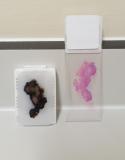Test Directory
ALK gene rearrangement
Containers - Adult

FFPE block / H&E slide / Pathology report
|
|
Laboratory Site
Old Dalkeith Road
Edinburgh
EH16 4SA
Transport arrangements
How to request
ALK gene rearrangement analysis can be requested individually or as part of the lung cancer panel.
Availability
Monday - Friday. 09:00 – 17:00
Anticipated turnaround
An integrated Molecular Pathology report should be available within 10 working days. See results.
Static information/disclaimer
ALK FISH is accredited to ISO15189.
ALK Immunohistochemistry is not currently accredited to ISO15189.
Please note, alternative methodologies may be used. Full details will be included in all reports.
General additional information
The anaplastic lymphoma kinase (ALK) gene encodes a tyrosine kinase normally expressed in neuronal cells. The ALK gene can, by deletion or translocation, form a fusion protein, which is abnormally expressed in approximately 2 to 5% of patients with non-small cell lung cancer. The presence of ALK gene rearrangement predicts response to ALK inhibitor therapy.
Immunohistochemistry is carried out to detect the ALK fusion protein using the D5F3 clone (Cell Signaling). ALK gene rearrangement analysis is carried out by fluorescence in-situ hybridization (FISH).
Analysis of the ALK gene is carried out as part of the lung cancer testing panel, which also includes EGFR and KRAS mutation analysis, PD-L1 expression and detection of ROS1 gene rearrangments.
For clinical advice on appropriate investigations, please contact our Molecular Pathology team.